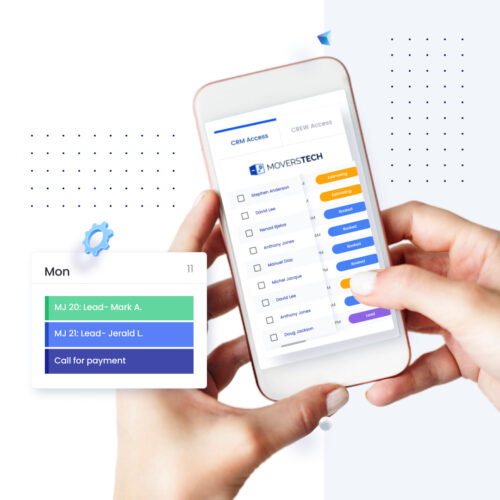This article explains the key signs it’s time to upgrade or switch your CRM, especially for moving companies facing scheduling errors, unreliable data, missing automation, limited integrations, poor customer experiences, or rising costs. It outlines clear red flags that show when a CRM is holding your business back instead of helping it grow.
If you are constantly dealing with scheduling errors, frustrated customers, or endless manual tasks that should be automated, it may be time to change your CRM. These are clear signs that your current system is holding your moving company back. When operations feel more chaotic instead of organized, it is worth stepping back and asking a direct question: Is your CRM helping your team work better, or slowing everything down? What are the signs that you need a crm upgrade? Understanding this will help you avoid bigger operational issues later. MoversTech CRM will tell you about the most common red flags that signal when it is time to change your CRM and run your moving business more efficiently.
Clear signs that it’s time to change your CRM
As a business owner, you need to understand how your business functions and the importance of CRM. So, instead of exclusively focusing on the signs we will outline, try to look at your business as a whole and only then decide what’s best to do. Here are the red flags and signs that it’s time to change your CRM:
- Your CRM doesn’t satisfy your business needs
- You cannot rely on your data
- You cannot connect your CRM to other aspects of your business
- You don’t have the necessary workflow automation
- Your CRM is too complex for dispatchers and sales teams
- Your system creates poor customer experiences
- You can’t rely on support when needed
- Your CRM costs outweigh the benefits
- Your CRM is not accessible on mobile devices
Your CRM doesn’t satisfy your business needs
Starting with a CRM system is often a smart move for any moving company. It helps collect and use customer data to support daily work like scheduling, dispatch, and follow-ups. Many small businesses know that having a CRM is beneficial, but budget limits often push them toward basic tools that only cover early needs. As your company grows, those limits show up fast. You take on more jobs. You add dispatchers. Your sales team handles more leads. If your system cannot keep up, it becomes clear that it is time to change your CRM.
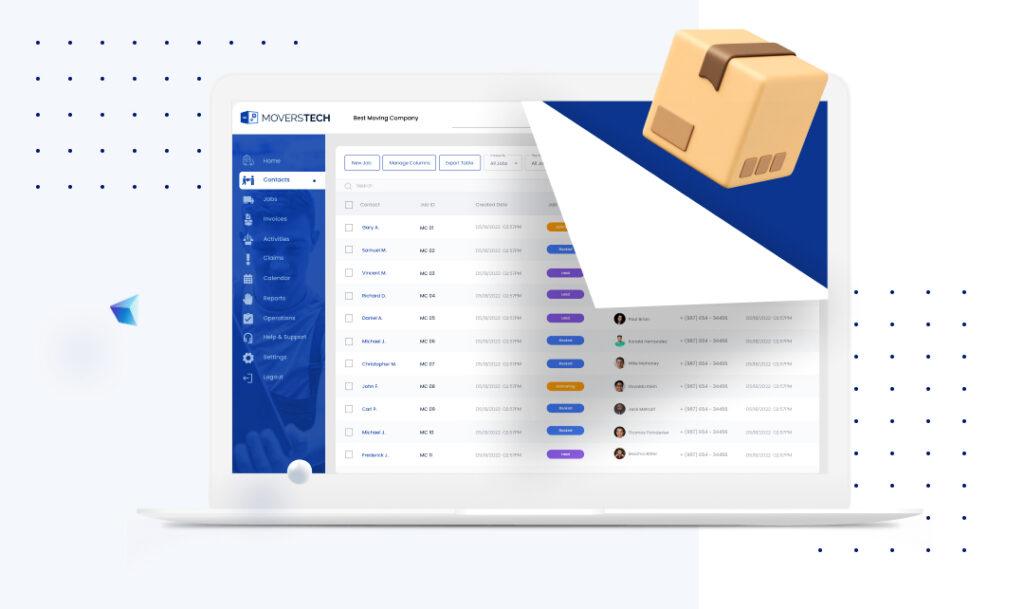
Modern moving companies need more than contact storage. You may need digital signatures to close estimates faster. You may need interactive dashboards to track jobs, revenue, and crew load in one place. Scalable user access also matters. Adding a dispatcher or sales rep should not require workarounds or extra tools. A CRM should grow with your dispatcher and sales needs, not block them. Managing estimates, contracts, and confirmations should not require separate tools. A CRM that supports moving company documents helps your team create, send, and track paperwork without slowing down jobs.
When your current system forces you to rely on spreadsheets, emails, or manual steps to cover these gaps, that answers the question, “What are the signs that you need a CRM upgrade?” The system is no longer supporting how your business actually runs.
You cannot rely on your data
With a CRM, you collect information that guides daily decisions. Job details, customer history, crew notes, and follow-ups all depend on accurate records. Many owners forget that data is one of the most valuable sources you can gather when running a moving company. When that data is unreliable, every part of the operation feels the impact.
If your CRM produces incomplete reports, outdated job details, or conflicting numbers, it quickly becomes hard to trust. Dispatchers may assign the wrong crew size. Sales teams may follow up too late or miss leads entirely. These issues often appear before owners realize it is time to change their CRM.
Unreliable data is also one of the clearest CRM vendor switch indicators. When your system cannot support clear reporting or consistent records, it increases errors and missed opportunities. At that point, the question is no longer whether data matters, but whether your CRM is capable of supporting informed decisions.
You cannot connect your CRM to other aspects of your business
A CRM is not only a place to store customer details. Office staff, dispatchers, and sales teams rely on CRM data to make daily decisions. When systems do not connect properly, even simple tasks get harder than they should be. Payroll takes longer. Job assignments require manual checks. Team coordination breaks down.
As your moving company grows, disconnected tools create friction. Dispatchers may track jobs in one system while payroll runs in another. Sales updates may never reach operations. These gaps slow response times and increase mistakes. When your CRM cannot support these connections, it often signals that it is time to change your CRM.
This issue also helps answer when to switch CRM vendors. If your system cannot link core parts of your business into one workflow, it limits growth. A CRM should reduce complexity, not force your team to manage separate tools just to stay organized.
You don’t have the necessary workflow automation
Many older systems offer little more than basic contact management. They store information but leave your team to handle everything else manually. For moving companies, this quickly becomes a problem. Dispatch, follow-ups, status updates, and confirmations all require speed and accuracy. When these steps are manual, mistakes pile up.
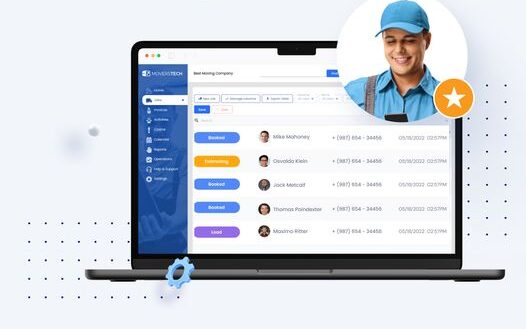
Automation helps moving companies work faster without adding staff. It reduces double entry, missed updates, and last-minute confusion. When your CRM cannot automate key steps or help streamline dispatch, it creates delays across the day. At that point, it is often time to change your CRM.
Lack of automation is a common trigger for a CRM switch, especially as job volume grows. If your team spends hours doing tasks that software should handle, the system is no longer supporting operations. Automation is not a bonus feature. It becomes a requirement as your business scales.
Your CRM is too complex for dispatchers and sales teams
A CRM should make daily work easier. When the system feels confusing or overloaded, teams start avoiding it. Dispatchers may spend extra time clicking through screens instead of assigning crews. Sales reps may skip logging calls or updating leads because the process takes too long. Over time, important details never make it into the system.
When systems feel heavy or confusing, even basic tools like lead capture software go underused, which causes missed follow-ups and lost booking opportunities. Complex features often look powerful on paper but slow down real work. If your team needs constant explanations or workarounds just to complete basic tasks, that is a clear sign that it is time to change your CRM. Software should support your workflow, not compete with it.
Low adoption is one of the strongest CRM vendor switch indicators. When dispatchers, sales teams, or field crews stop using the system, the data becomes unreliable, and operations suffer. This usually answers the question: “What are the signs that you need a CRM upgrade?” A system that your team avoids will never deliver value, no matter how many features it offers.

Your system creates poor customer experiences
Moving is already stressful for customers. When your CRM adds confusion instead of clarity, that stress increases. Missed arrival windows, delayed updates, and unclear communication often trace back to system limitations. A CRM should support clear coordination, not create gaps between your team and your customers.
Strong moving companies depend on a CRM that builds customer relationships through consistent communication and reliable scheduling. If your system makes it hard to track job status, share updates, or respond quickly, it is obvious that it is time to change your CRM. Customer complaints tied to miscommunication are also strong signals during a CRM switch evaluation. When service quality drops because your tools cannot keep up, the problem is no longer training or effort. It is the system itself.
You can’t rely on support when needed
CRM issues rarely happen at a convenient time. When a system slows down or stops working during a busy day, everything backs up. Dispatch pauses an crews wait for updates. Also, customers do not get answers. In the moving industry, even short downtime can mean lost jobs. When this happens often, it is usually time to change your CRM.
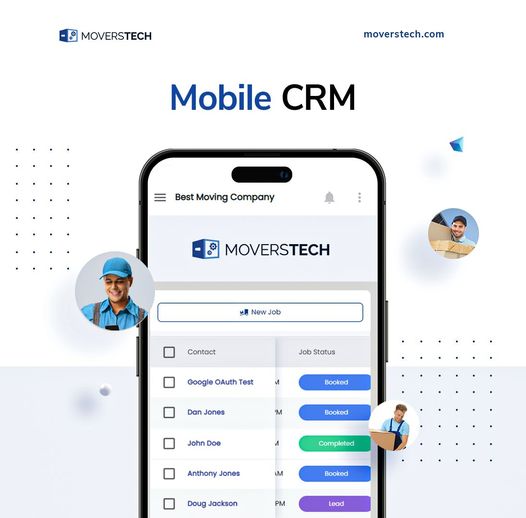
Support delays increase risk, especially during peak season. If your provider takes hours or days to respond, small problems turn into revenue losses. Missed schedules and delayed invoices add pressure across the operation. This is one of the clearest moments when switching CRM vendors becomes obvious.
Reliable support is not a bonus. It protects daily operations. When your CRM provider cannot respond quickly or resolve issues fully, the system becomes a liability instead of a tool.
Your CRM costs outweigh the benefits
A CRM should save time and reduce errors. When costs keep rising without clear returns, it is harder to justify the expense. Many moving companies start on lower plans, then see prices climb as users, jobs, or features increase. If those added costs do not improve daily operations, it may be time to change your CRM.
High CRM costs often show up in indirect ways. Manual corrections increase. Overbooking becomes harder to control. Billing issues take longer to resolve. Systems that lack effective ways to prevent overbooking often create more work instead of less. When that happens, the value no longer matches the price. This is a common trigger for a CRM switch. If your software drains resources without improving efficiency, it affects growth. A CRM should support profitability, not compete with it.
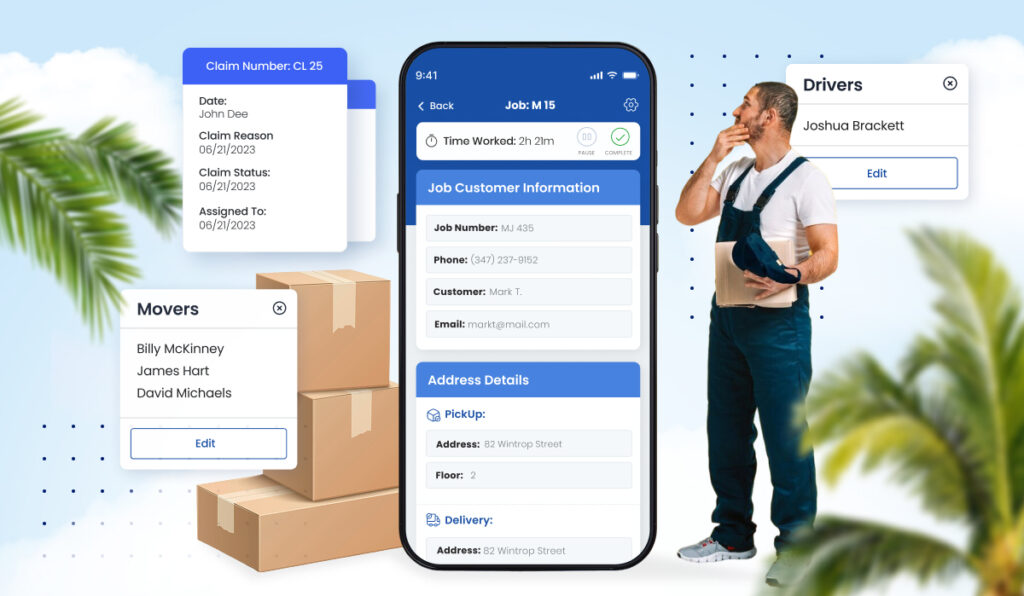
Your CRM is not accessible on mobile devices
Moving companies do not operate from desks alone. Dispatchers work on the move. Sales teams answer calls between tasks. Crews need job details in real time. If your CRM does not work well on mobile devices, it slows everything down. When teams cannot access schedules, notes, or updates from the field, mistakes become more common.
A system without reliable mobile access creates gaps in communication. Crews may miss changes. Dispatchers may rely on calls or texts instead of live updates. Over time, this friction makes it clear that it is time to change your CRM.
Mobile limitations are also clear CRM vendor switch indicators. When your team needs flexibility but the software cannot deliver it, productivity drops. A modern moving business needs tools that work wherever the job happens, not only in the office.
Take action and upgrade to a better system
Recognizing the red flags is the first step. Acting on them is what protects your business. When scheduling errors increase, teams avoid the system, or support becomes unreliable, it is often time to change your CRM. Ignoring these signals allows small issues to turn into daily problems that slow growth. A better system should match how your moving company actually operates. It should support dispatch, sales, crews, and customers without adding friction. If you have been asking, “What are the signs that you need a CRM upgrade?”, this is your moment to reassess. A planned change now can restore clarity, improve efficiency, and give your team tools they trust every day.
Reviewed by: Ned Bjelos
